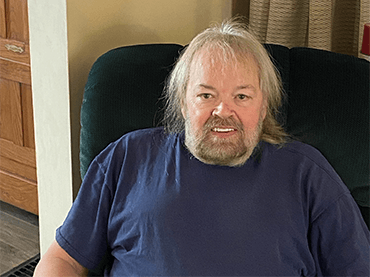Until his retirement in 2021, Arthur “Skip” Salada of New Brighton, Pa., helped run a steel mill and then spent six years on the road as a triaxle truck driver.
“I’m definitely enjoying the slower pace of life today,” he says.
But on July 28, 2022, Skip didn’t seem himself when his wife, Becky, left for work that morning. She checked in to see how he was doing around lunch time. Skip remembers relaxing in his living room watching TV; he told her he was fine.
When Becky arrived home that evening, she found Skip, then 67, showing classic signs of a stroke. One side of his face was droopy and his speech was slurred. Despite his protests, she and one of their three sons drove him to the closest hospital. After multiple tests for his heart and brain, doctors decided to send Skip to UPMC Mercy by helicopter.
UPMC Mercy is certified as a Comprehensive Stroke Center by The Joint Commission and the American Heart Association/American Stroke Association. Only an elite group of hospitals hold this highest level of stroke certification, which recognizes state-of-the-art care for the most complex stroke cases.
The stroke team met Skip on UPMC Mercy’s helipad and rushed him to the hospital’s specialized neurovascular operating suite. Waiting for his arrival was neuroendovascular surgeon Alhamza Al-Bayati, MD, a member of the UPMC Stroke Institute.
UPMC Mercy stroke team used advanced neuroimaging to check the size and location of the clot. Dr. Al-Bayati then performed endovascular thrombectomy (EVT) — a breakthrough minimally invasive technique that can remove blood clots from large arteries in the brain. This advanced treatment has been shown to dramatically reduce brain damage and stroke-related disabilities.
A thin, flexible catheter was threaded into the artery in Skip’s groin and up through the neck to the brain. Assisted by x-ray guided imaging, Dr. Al-Bayati used a mesh-like device called stent retriever to grab the clot and restore blood flow.
“I was amazed to be awake during the surgery,” says Skip. “Dr. Al-Bayati talked me through the operation, telling me what I should at expect to feel. He told us it was a very large clot — but that he got it all.”
Skip was hospitalized for an additional two days.
“Then I walked out on my own with just a cane to help with my balance. No one could believe I did so well,” he says.
He met once with a speech and physical therapist, but he didn’t need long-term therapy.
Skip’s only sign of the stroke is “sometimes I feel it takes me too long to find the right word, but that little gets better every day.” He’s looking forward to riding his motorcycle in the spring.
“I never had a history of heart or vascular problems, so never thought something like a stroke could happen to me,” says Skip. “I’m incredibly grateful my wife found me and insisted I get help — and that I had a surgeon as skilled as Dr. Al-Bayati to operate on me. It’s a miracle I’ve recovered so well — thanks to him.”

















